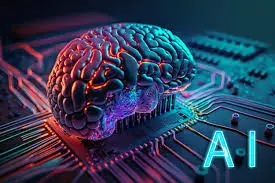AI in healthcare is revolutionizing , transforming how medical professionals diagnose, treat, and manage diseases. With its ability to analyze vast amounts of data quickly and accurately, AI is enhancing patient care in ways previously unimaginable. This article explores the innovative applications of AI in healthcare and their profound impacts on patient care.
The Role of AI in Diagnostics
One of the most significant contributions of AI in healthcare is its ability to improve diagnostic accuracy. AI algorithms, particularly those involving machine learning and deep learning, can process and analyze medical data far more quickly and accurately than human practitioners.
Imaging and Radiology
AI is making waves in medical imaging and radiology, where it is used to interpret X-rays, MRIs, CT scans, and other imaging modalities. AI algorithms can detect patterns and anomalies that may be missed by the human eye. For example, AI systems have demonstrated remarkable accuracy in identifying early signs of cancer, such as breast cancer in mammograms and lung cancer in CT scans. These early detections can significantly improve patient outcomes by enabling earlier and more targeted treatments.
Pathology
In pathology, AI-powered systems can analyze tissue samples and identify disease markers with high precision. Digital pathology, combined with AI, allows for faster and more accurate diagnoses of conditions such as cancer, infectious diseases, and genetic disorders. This not only speeds up the diagnostic process but also reduces the potential for human error.
Genomics
AI is also making strides in genomics, where it helps interpret complex genetic data. AI algorithms can identify genetic mutations and variations linked to specific diseases, facilitating personalized medicine approaches. By analyzing a patient’s genetic makeup, AI can predict their risk of developing certain conditions and recommend preventive measures or tailored treatments.
Enhancing Treatment Plans
AI is not only improving diagnostics but also enhancing treatment plans, making them more personalized and effective.
Personalized Medicine
Personalized medicine, or precision medicine, tailors treatment to an individual’s unique genetic profile, lifestyle, and environment. AI plays a crucial role in this approach by analyzing vast amounts of patient data to identify the most effective treatments. For instance, AI can predict how a patient will respond to a particular drug, allowing doctors to choose the best therapy with the least side effects. This approach is particularly valuable in treating complex conditions like cancer, where treatment efficacy can vary widely among patients.
Drug Discovery and Development
The process of drug discovery and development is notoriously time-consuming and expensive. AI is streamlining this process by predicting which drug candidates are most likely to be effective and safe. By analyzing biological data, AI can identify potential targets for new drugs and predict their interactions with various proteins in the body. This accelerates the development of new treatments and reduces costs, ultimately bringing life-saving drugs to market more quickly.
Treatment Monitoring and Management
AI-driven tools are helping healthcare providers monitor and manage patient treatments more effectively. For example, AI-powered wearable devices can track vital signs and other health metrics in real time, alerting doctors to potential issues before they become serious. AI algorithms can also analyze patient data to identify trends and suggest adjustments to treatment plans, ensuring that patients receive the best possible care.
AI in Surgery
Surgical procedures are benefiting immensely from AI technologies, which are enhancing precision, safety, and outcomes.
Robotic Surgery
Robotic surgery systems, such as the da Vinci Surgical System, use AI to assist surgeons in performing complex procedures with greater precision and control. These systems provide real-time feedback and guidance, allowing surgeons to make more accurate incisions and reduce the risk of complications. AI-driven robotic surgery is particularly beneficial in minimally invasive procedures, where precision is critical.
Preoperative Planning
AI is also improving preoperative planning by analyzing patient data and surgical outcomes to create detailed, personalized surgical plans. These plans help surgeons anticipate potential challenges and optimize their approach, reducing the risk of complications and improving patient outcomes.
Postoperative Care
In postoperative care, AI-driven tools monitor patients’ recovery and alert healthcare providers to potential issues. For instance, AI can analyze data from wearable devices and other sensors to detect signs of infection or complications, enabling timely intervention and reducing the risk of readmission.
AI in Telemedicine
Telemedicine has seen a significant boost from AI technologies, particularly during the COVID-19 pandemic. AI-driven tools are enhancing remote patient care and making healthcare more accessible.
Virtual Health Assistants
AI-powered virtual health assistants, such as chatbots and voice-activated systems, provide patients with instant medical advice and support. These virtual assistants can answer questions, schedule appointments, and even triage symptoms, directing patients to the appropriate level of care. This improves access to healthcare, especially for those in remote or underserved areas.
Remote Monitoring
AI is enabling remote monitoring of chronic conditions, allowing patients to manage their health from home. Wearable devices and mobile apps equipped with AI algorithms track vital signs, medication adherence, and other health metrics. This data is analyzed in real time, providing healthcare providers with insights into a patient’s condition and enabling timely interventions.
Diagnostic Support
Telemedicine platforms are using AI to enhance diagnostic support during virtual consultations. AI algorithms analyze patient data and provide doctors with diagnostic suggestions and treatment recommendations. This support is particularly valuable in areas with limited access to specialist care, ensuring that patients receive accurate and timely diagnoses.
Improving Operational Efficiency
Beyond direct patient care, AI is improving the operational efficiency of healthcare organizations, leading to better resource management and cost savings.
Administrative Tasks
AI is automating routine administrative tasks, such as scheduling appointments, processing insurance claims, and managing patient records. This reduces the administrative burden on healthcare staff, allowing them to focus more on patient care. For example, AI-powered chatbots can handle appointment scheduling and reminders, reducing no-show rates and optimizing clinic schedules.
Predictive Analytics
AI-driven predictive analytics help healthcare organizations forecast patient demand, optimize staffing levels, and manage resources more effectively. By analyzing historical data and current trends, AI can predict patient volumes and identify potential bottlenecks in care delivery. This allows hospitals to allocate resources more efficiently and improve patient flow.
Supply Chain Management
AI is also improving supply chain management in healthcare by predicting demand for medical supplies and optimizing inventory levels. This ensures that hospitals have the necessary supplies on hand without overstocking, reducing costs and minimizing waste.
Ethical Considerations and Challenges
While the potential benefits of AI in healthcare are immense, it is important to consider the ethical implications and challenges associated with these technologies.
Data Privacy and Security
AI systems rely on vast amounts of patient data, raising concerns about privacy and security. It is crucial to implement robust data protection measures and ensure that patient information is stored and transmitted securely. Additionally, patients should be informed about how their data is used and have the option to opt-out if they choose.
Bias and Fairness
AI algorithms can inadvertently perpetuate or even exacerbate existing biases in healthcare. For example, if an AI system is trained on data that predominantly represents a particular demographic, it may not perform as well for other populations. Efforts must be made to ensure that AI systems are trained on diverse and representative data to avoid biased outcomes.
Transparency and Accountability
The decision-making processes of AI systems can be complex and opaque, making it difficult to understand how certain conclusions are reached. Ensuring transparency and accountability in AI systems is essential, particularly in healthcare, where decisions can have significant consequences. Healthcare providers should be able to understand and explain how AI-driven recommendations are made.
Regulatory and Legal Issues
The rapid adoption of AI in healthcare raises regulatory and legal challenges. It is important to establish clear guidelines and standards for the development, testing, and deployment of AI systems in healthcare. This includes ensuring that AI systems meet safety and efficacy standards and that they are subject to ongoing monitoring and evaluation.
The Future of AI in Healthcare
The future of AI in healthcare holds tremendous promise, with ongoing advancements and new applications continually emerging.
Integration with Electronic Health Records (EHRs)
AI integration with electronic health records (EHRs) is expected to improve patient care by providing healthcare providers with comprehensive and actionable insights. AI can analyze EHR data to identify trends, predict outcomes, and recommend personalized treatment plans. This seamless integration will enhance clinical decision-making and improve patient outcomes.
AI-Driven Research and Clinical Trials
AI is poised to revolutionize medical research and clinical trials by analyzing vast amounts of data to identify potential treatments and predict their efficacy. AI can also help design and optimize clinical trials, reducing the time and cost associated with bringing new treatments to market.
Expansion of Telemedicine
The expansion of telemedicine, supported by AI technologies, will continue to improve access to healthcare, particularly in remote and underserved areas. AI-driven tools will enhance the quality of virtual consultations and provide patients with personalized care from the comfort of their homes.
Preventive and Predictive Healthcare
AI’s ability to analyze large datasets and identify patterns will enable a shift towards preventive and predictive healthcare. AI can help identify individuals at risk of developing certain conditions and recommend preventive measures, reducing the incidence and severity of diseases.
Collaboration and Interoperability
Collaboration and interoperability between different AI systems and healthcare providers will be crucial for maximizing the benefits of AI in healthcare. Ensuring that AI systems can communicate and share data seamlessly will improve care coordination and patient outcomes.
AI is transforming healthcare in profound ways, from improving diagnostic accuracy and personalized treatment plans to enhancing surgical procedures and operational efficiency. While the potential benefits are immense, it is important to navigate the ethical and practical challenges associated with AI in healthcare. By addressing these challenges and continuing to innovate, AI has the potential to revolutionize patient care and create a more effective, efficient, and equitable healthcare system.

